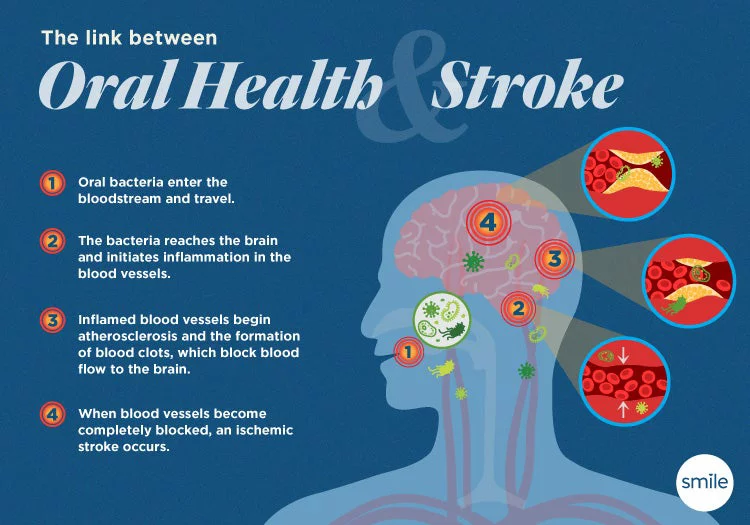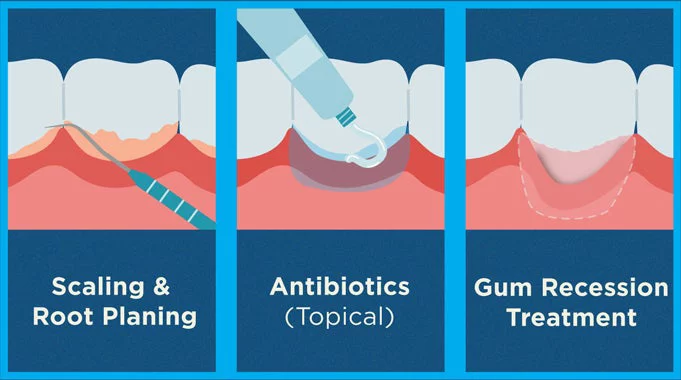Blog Summary: Poor oral health doesn’t just affect your mouth — it can raise your risk of stroke. Research shows gum disease and oral bacteria trigger inflammation that harms blood vessels and the brain. Taking care of your gums is a simple way to protect both your smile and your overall health.
UPDATE: Evidence updated to 2024–2025 AHA/ASA guideline era with recent meta-analyses and randomized-trial data
How Oral Health Ties Into Stroke Risk: Preventing and treating gum disease improves your cardiovascular risk profile (inflammation, vessel function, sometimes blood pressure). Gum disease doesn’t directly cause strokes, but people with unhealthy gums have a higher risk. Keep your gums calm, your pressure controlled, and your habits boringly consistent. [1–5]
Like many other systemic health conditions, strokes are associated to poor oral health. For example, one indication of poor oral health is the presence of bacteria and plaque that causes periodontal disease, also called gum disease. The effects of having active and untreated gum disease lead to a higher risk of stroke. Gum disease is common, about 42% of U.S. adults 30+ are affected, and ~8% have sever disease (NHANES 2009-2014). [8-9]
The connection between tooth infection and the brain is part of an area of oral health we call the Mouth-Body Connection®. The Mouth-Body Connection explains how oral cavity diseases, like periodontal disease, affect the whole body. To put it another way, gum disease and the bacteria that cause it have adverse effects on the rest of your body.
Curious to know more about the Mouth-Body Connection? Come read more about Periodontal Disease and its effects on your overall health.
Key Things to Know:
• Poor oral health and gum disease increase the risk of stroke.
• The Mouth-Body Connection® shows how oral disease impacts the entire body.
• The U.S. Surgeon General recognized the oral–systemic health link in 2000.
• Inflammation and oral bacteria entering the bloodstream are two main reasons oral health affects stroke risk.

What Is the Link Between Oral Health and Stroke?
When the oral bacteria causing gum disease enter your bloodstream, they travel. These bacteria can cause C-reactive protein levels to increase, which indicates the blood vessels are inflamed. [3] Inflammation can stress blood vessels over time, which can block the blood flow to the brain and increase the risk of heart disease and stroke. [4]
“Research is showing that ongoing gum infection... allows bacteria from our mouth to enter the bloodstream and then directly into the brain.”
— Dr. Christopher Tolmie, "Why Oral Health is Crucial For Whole-Body Health"
Video link: https://www.youtube.com/watch?v=6-W_SFV5HQg&t=1s
The arterial hardening is associated with a specific type of stroke. A 2004 German research study revealed that individuals — particularly men and people under 60 — with severe periodontitis and gum disease had an increased risk of experiencing an ischemic stroke, which occurs when a blood vessel supplying the brain becomes blocked. [5]
Moreover, ischemic strokes are the more common type. Per the CDC, 85% of patients who have strokes have ischemic ones. [8]
- Individuals genetically disposed to cavities, missing teeth, or needing dentures were more likely to have silent cerebrovascular disease, evident through a 24% increase in white matter hyperintensities visible on MRI images.
- People who are more likely because of heredity to have poor oral health showed more damage to the “fine architecture of the brain” and had a 43% variance in microstructural damage scores visible on MRI scans. [10]
Cyprien Rivier, MD, MS, a researcher involved in the study, said while it looks like poor oral health causes declines in brain health, they needed to confirm whether improving oral health can benefit brain health with more studies. Dr. Rivier also emphasized the importance of maintaining good oral hygiene because there are implications “far beyond the mouth.” [11]
Does Having a Stroke Increase Gum Disease Risk?
However, while these inflammatory responses protect the body in some ways, they also reduce the patients' immunity to bacterial infection. This response leaves stroke patients more susceptible to secondary complications, such as infections or cardiovascular pathologies. Researchers suggest addressing inflammation after stroke can improve patient outcomes. [15]
Learn more about inflammation and its overall effects on the body!
Key Things to Know:
• Gum disease and stroke are linked by inflammation.
• Oral bacteria can cause clots that block blood flow.
• People with gum disease face higher stroke risk.
• Stroke inflammation weakens immunity and gums.

Can Preventing Gum Disease Lower Your Risk of a Stroke?
- Scaling and Root Planing: This deep cleaning treatment helps clear out the bacteria and plaque below the gum line and makes it harder for them to assemble there.
- Antibiotics: In some cases, your dentist might also use a topical antibiotic to eliminate the bacteria there.
- Gum Recession Treatment: Dentists also have ways to address gum tissue loss to protect the roots from decay or to surgically graft tissue from other parts of your mouth to cover roots and protect your teeth.
“Early intervention and detection are key... saliva screening and other tools help us identify risks before they become major health problems.”
— Dr. Christopher Tolmie, "Why Oral Health is Crucial For Whole-Body Health"
However, it is also essential to maintain a consistent and thorough oral hygiene home care routine to keep your gums healthy. Brushing your teeth twice daily for at least two minutes with fluoride toothpaste is a great start. Also, flossing at least once daily is vital to clear out bacteria and food particles hiding where the toothbrush doesn't reach. Furthermore, cleaning your tongue and rinsing the mouth with either water or mouthwash after cleaning your teeth is essential. Moreover, avoiding sugary drinks and snacks is necessary to keep your teeth healthy, and if you can't avoid them, ensure that you clean your teeth after consuming them. [18]
These visits also present an opportunity to get more information. If you have concerns about your oral health or whether you have a higher risk for stroke, talk to your dentist during the appointment. They can assess your risk and devise a plan to keep your mouth as healthy as possible and any related oral health risks for a stroke to a minimum.
“When the patient is educated, they can make better decisions for their overall health.”
— Dr. Zulema Valdivia, "Why Oral Health is Crucial For Whole-Body Health"
So, it is clear that your oral health is connected to your overall health. It is also apparent that the pathogens that cause gum disease and inflammation travel throughout the body, affecting other distant-site diseases or systemic conditions and can increase your risk for stroke. However, we believe that through our understanding of the Mouth-Body Connection, our experienced clinicians can help you maintain your best oral health and eliminate some of the risks of developing these conditions.
Key Things to Know:
• Preventing gum disease lowers stroke risk.
• Nearly half of adults 30+ have gum disease.
• Untreated gum disease can lead to tooth and bone loss.
• Treatments include deep cleaning, antibiotics, and gum care.
• Good daily hygiene and regular dental visits are essential.
Find a Dentist Near You
For more information or to find a Smile Generation dentist near you use our Find a Dentist Tool.
Find your trusted, local dentist today!
Ask the Doctor: Oral Health & Stroke Q&A
Yes—large reviews show higher stroke odds in people with periodontitis; severity matters. [1]
Bacterial DNA from the mouth has been found in carotid/atherosclerotic plaques—plausible pathway, not proof of causation. [2]
No. Bleeding usually means inflammation. That’s your early warning light—address it now. [4]
Yes. Periodontitis is often silent until late. Screening is quick and painless. [4]
It improves your cardiovascular risk profile (inflammation, vessel function, sometimes blood pressure). Large, long trials confirming fewer strokes are still in progress. [3]
The one you’ll use daily. Power brushes help many people. If disease is active, your dental team will tailor specifics. [4]
Yes. Tell your dentist. We’ll coordinate with your medical team and keep visits gentle, safe, and focused on calming inflammation. [3]
Sources
[1] US Department of Health and Human Services. Oral Health in America: A Report of the Surgeon General. Rockville, MD: US Department of Health and Human Services, National Institute of Dental and Craniofacial Research, National Institutes of Health, 2000. (Accessed: 10 May 2023).
[2] Ada.org. 2019. Oral Systemic Health. [online] Available at: <https://www.ada.org/resources/research/science-and-research-institute/oral-health-topics/oral-systemic-health> [Accessed 10 May 2023].
[3] The Connection Between Oral Health And Strokes | Colgate® (2023). Available at: https://www.colgate.com/en-us/oral-health/threats-to-dental-health/the-connection-between-oral-health-and-strokes# (Accessed: 9 May 2023).
[4] The Link Between Oral Health & Strokes | ProHealth Dental™ (2022) Available at: https://www.phdental.com/oral-health-news/2022/april/the-link-between-oral-health-strokes/ (Accessed: 9 May 2023)
[5] Grau, MD, Armin J.; Becher, Ph.D., Heiko; Christoph M. Ziegler, MD et al. "Periodontal Disease as a Risk Factor for Ischemic Stroke." Stroke (2004) 35: 496-501. Web Stroke.ahajournals.org. < http://stroke.ahajournals.org/content/35/2/496.full> (Accessed: 12 May 2023).
[6] Sfyroeras, GS; Roussas, N., Saleptsis, VG, et al. "Association between periodontal disease and stroke." J Vasc Surg. 2012 Apr;55(4):1178-84. doi: 10.1016/j.jvs.2011.10.008. Epub 2012 14 January. Web. www.ncbi.nlm.nih.gov. < http://www.ncbi.nlm.nih.gov/pubmed/22244863>. (Accessed: 12 May 2023)
[7] Gum disease, inflammation, and hardened arteries may be linked to stroke risk (2020). Available at: https://newsroom.heart.org/news/gum-disease-inflammation-hardened-arteries-may-be-linked-to-stroke-risk#:~:text=Gum%20disease%20was%20more%20common,blood%20vessels%20outside%20the%20skull. (Accessed: 10 May 2023).
[8] Types of Strokes. www.cdc.gov. Web. 4 May 2016. < https://www.cdc.gov/stroke/about.htm. The article refers to: Go AS, Mozaffarian D, Roger VL, Benjamin EJ, Berry JD, Borden WB, et al. Heart disease and stroke statistics—2013 update: a report from the American Heart Association. Circulation. 2012:e2–241. (Accessed: 12 May 2023).
[9,10,11] Poor oral health may contribute to declines in brain health (2023). Available at: https://newsroom.heart.org/news/poor-oral-health-may-contribute-to-declines-in-brain-health (Accessed: 8 June 2023).
[12] Dr. Sanchari Sinha Dutta, P. (2018) Inflammation and Stroke, News-Medical.net. Available at: https://www.news-medical.net/health/Inflammation-and-Stroke.aspx (Accessed: 12 May 2023).
[13, 15] Systemic Inflammation after stroke: implications for post-stroke comorbidities. (2022) EMBO Mol Med 14: e16269. Available at: https://www.embopress.org/doi/full/10.15252/emmm.202216269 (accessed 12 May 2023)
[14] Identifying how inflammation affects stroke recovery (2022). Available at: https://www.uc.edu/news/articles/2022/10/identifying-how-inflammation-affects-stroke-recovery.html (Accessed: 12 May 2023).
[16] Eke PI, Dye BA, Wei L, Thornton-Evans GO, Genco RJ. Prevalence of Periodontitis in Adults in the United States: 2009 and 2010. Journal of Dental Research. 2012;91(10):914-920. doi:10.1177/0022034512457373 (Accessed: 12 May 2023).
[17] Gum Disease Information - American Academy of Periodontology (2023). Available at: https://www.perio.org/for-patients/gum-disease-information/ (Accessed: 10 May 2023).
[18] Looking after your mouth and teeth (oral hygiene). Stoke Association. Available at: https://www.stroke.org.uk/effects-of-stroke/looking-after-your-mouth-and-teeth-oral-hygiene#:~:text=Tips%20for%20good%20oral%20hygiene,your%20teeth%2C%20tongue%20and%20mouth. (accessed: 12 May 2022).
Smile Generation blog articles are reviewed by a licensed dental professional before publishing. However, we present this information for educational purposes only with the intent to promote readers’ understanding of oral health and oral healthcare treatment options and technology. We do not intend for our blog content to substitute for professional dental care and clinical advice, diagnosis, or treatment planning provided by a licensed dental professional. Smile Generation always recommends seeking the advice of a dentist, physician, or other licensed healthcare professional for a dental or medical condition or treatment.









